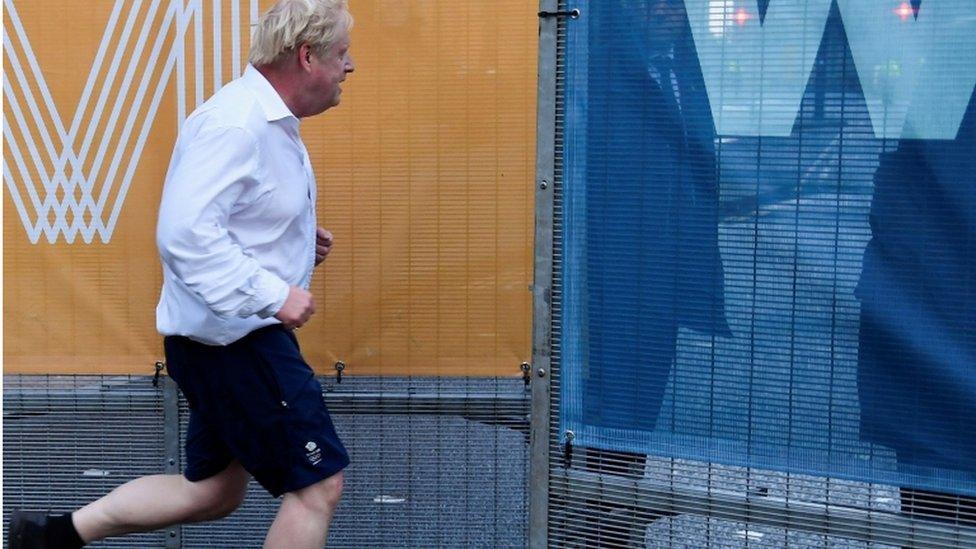Is the Tory party at ease with itself on tax?
- Published

Boris Johnson was photographed this morning in what might diplomatically be described as an unusual choice of running gear.
The oh-so-natural political leader's jog at conference is a standard part of the annual routine, by the way, before you feel bad that he was caught out unawares, running in what appeared to be a normal business shirt, with shorts, black socks and black shoes - a rather strangely matched outfit.
If you forgive the sartorial metaphor, there will be questions this week over whether the Tory outfit really matches these days.
The party has a whopping majority. They are ahead in the polls, despite very real turbulence in parts of the economy.
But Boris Johnson's political dominance doesn't mean this is a party at ease with itself.
And that's already been obvious in Manchester over what should, traditionally, be an issue that binds Tories together- the question of tax.
The prime minister protested loudly on the TV sofa this morning, proclaiming his own zeal for keeping taxation low. Remember though that under his premiership taxation will hit the highest ever sustained level.
Whether that's paid by workers through the latest big move, an increase to National Insurance payments, or ratcheting up taxes on business, this is a government that has presided over an enormous expansion of the state that comes with a huge price tag that has to be paid for somehow.
Boris Johnson on the Andrew Marr Show: "We don't want to raise taxes"
Boris Johnson likes spending.
The chancellor doesn't like borrowing.
That means taxes have had to go up.
The emergency of the pandemic was, of course, the reason that the spending taps turned on at such a pace to keep wages and services flowing.
But with the acute phase of that past, there are questions swirling in Manchester over what the shape of tax and spend should look like next.
Two cabinet ministers, who would protest that their loyalty to Boris Johnson was undimmed, made it perfectly plain they that in their view tax has gone far enough.
Jacob Rees Mogg, in a double breasted suit, striped shirt and watch chain said, taxes were "at the upper reaches of reasonableness".
Liz Truss, the new foreign secretary, whose ambition is matched by the growing size of her new power blow dry, told the BBC: "We need to keep the tax burden low," arguing that the Tories are a "low tax party".
First test
It is not surprising that is what they believe. But it is notable that they both made those comments like that mere weeks after the cabinet signed off (not that they had much choice) a significant and expensive change to the tax system to pay for the NHS.
For those ministers who have drawn that line publicly, there are dozens more of their colleagues and MPs who privately share that discomfort.
And there are at least a dozen fringe events relating to tax issues at the conference this week. It would be worth a small wager that those meetings will not be calling for families and business to stump up more.
Yet just as all our worlds have changed since the Tories last got together like this, so have theirs. It's the first full conference when some of those who represent millions of voters who chose them for the first time in 2019 are gathering with those for whom this is a return to routine.
As the Tees Valley Mayor, Ben Houchen, who has his own very healthy electoral mandate, suggested today, the patience of those new voters promised all sorts of improvements to their lives under the slogan of levelling up, won't last forever.
It's the first full conference when the Tories are trying to chart a course for themselves after the emergency of the pandemic.
It's the first full conference after our departure from the EU that dogged the Tory debate for years.
And this week is the first test of its kind of the coalition the was built by Brexit, a coalition that no-one here at conference can be sure will last.
